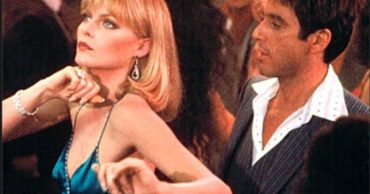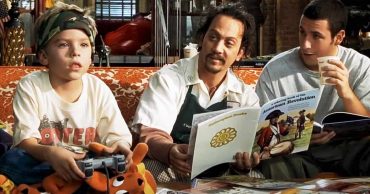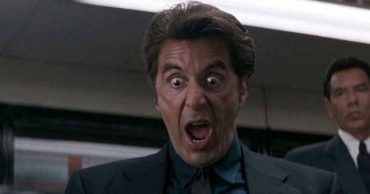
Have you ever noticed that in most Danny DeVito movies, he is rarely the focus but usually the best part? The sad truth is that Danny DeVito’s brilliance is many times unrecognized, often lost in the shuffle and habitually taken for granted. Two separate generations will know him most for two iconic television roles; Louie De Palma on Taxi and as Frank Reynolds on It’s Always Sunny in Philadelphia. Because of this, his abilities get lost within an image, a “DeVito” caricature. The result is an actor who is consistently great, always versatile, seldom overshadowed and frequently underrated. What follows are 6 fantastic Danny DeVito roles that go routinely overlooked when discussing his prolific film career. If you are not a fan of Danny DeVito, these will convert you. If you are a fan, these will remind you why.
Ralph — Romancing the Stone (1984)
Years later, film critic Roger Ebert would say of DeVito, “After seeing him on television’s “Taxi” and here and there in character roles, I first began to notice how good he was in “Romancing the Stone.” In a romantic action adventure flick starring two sex symbols, Danny DeVito provides the perfect counter balance. With romance novelist Kathleen Turner and dashing mercenary Michael Douglas hunting for treasure and simultaneously falling in love, DeVito plays Ralph, the lackey hoodlum cousin of the man holding Turner’s sister for ransom. As Ralph pursues the pair through the Colombian jungle, comedic gold ensues. Ralph is a criminal yet seems to be the only sincere character in the film. As he tells Douglas’ character, “Oh, oh I’m the creep, huh? Well at least I’m honest: I’m stealing this stone. I’m not trying to romance it out from under her”. With Ralph beautifully out of his element, classic lines abundantly flow such as when he explains the situation to his cousin: “Look, bullet head. If they’re hiking through the jungle there’s nothing I can do about it. I have a car. I am not Tarzan!” Douglas ends up with the stolen treasure but DeVito steals the show.
Sam Stone — Ruthless People (1986)
Danny DeVito takes callous to another level as Sam Stone and it manifests in perhaps the funniest role of his career. When Sam is asked by his wife’s kidnappers why he hasn’t come up with the ransom, he coolly responds: “Look pal, you’re asking a lot of cash. I haven’t got that kind of money lying around the house. It’s all tied up in investments so…sorry”. So goes the beauty of DeVito as Sam Stone. Stone is such a charismatically indecent character that it is a pleasure to see him fail yet you can’t help but root for him. In Ruthless People, Stone is an unscrupulous businessman who has plans to kill his unbearable wife and when the wife is actually kidnapped, he must begrudgingly get her back. A terrific script and great supporting cast aside; DeVito is the prize of this smart comedy. Endearingly uncouth, Stone is just as insatiable as a cretin can be. As Roger Ebert stated in his original 1986 review, “It is so hard to play a lovable villain, and Danny DeVito does it so easily”.
Ernest Tilley — Tin Men (1987)
In Barry Levinson’s portrait of feuding aluminum siding salesman in 1963 Baltimore, Richard Dreyfuss and Danny DeVito amuse and delight. Within a bevy of slimy schemes, the competing “tin men” try to outdo each other professionally, until their rivalry turns personal. As Tilley, DeVito is able to elicit audience sympathy while scamming innocent customers at the same time. It feels that Tilley’s deceitfulness isn’t by choice, it’s his only choice. Without the tricks, Tilley can’t close the deal and he knows it. Where DeVito truly triumphs in this role is being able to wrap his ashamed vulnerability in a false bravado that everyone believes. As when the Dreyfuss character boasts to Tilley about just bedding his wife, Tilley retorts, “Well that’s just fine by me. She’s a pain in the ass, an albatross around my neck. You’re welcome to her, keep her! And may you both rot in hell!” All of the witty deceptive dialogue is delivered flawlessly by Tilley, but DeVito makes him feel genuine while he’s doing it.
Lawrence Garfield — Other People’s Money (1991)
His moniker is “Larry the Liquidator” and Danny DeVito plays him to the tune of a beautiful captivating disdain. Garfield is not charming by choice, unsympathetic by nature and as he unapologetically states, loves “money more than the things it can buy… but what I love more than money is other people’s money”. The plot revolves around Garfield’s attempt to take over a second generation owned wire and cable business, headed by a decent and admirable patriarch personified nicely by Gregory Peck. In the middle is Kate, a no nonsense lawyer, Peck’s stepdaughter and the firm’s last hope against a corporate takeover at the hands of Larry the Liquidator. The interplay between Larry and Kate is flirtatious coy with adversarial moxie, all utterly entertaining. What shines in this film though is the remarkable way DeVito as Garfield is able to be so detestable, so offensive, so unsentimental yet, emerge as the voice of reason. During the film’s climax, a stockholder meeting is held where the principles must make their respective cases for the future of the company. After Peck gives an impassioned plea highlighting morality and integrity, he gets a standing ovation. Then it is Larry’s turn. DeVito rises and gives perhaps the finest soliloquy of his career. Larry mesmerizes by bluntly appealing to the bottom line. Telling the stockholders that the company is dead, he advises to “have the decency to sign the death certificate, collect the insurance, and invest in something with a future”. He continues; “‘Ah, but we can’t. We can’t because we have responsibility, a responsibility to our employees, to our community. What will happen to them?’ I got two words for that: Who cares?” Larry then goes for the jugular, “Who cares? I’ll tell you. Me. I’m not your best friend. I’m your only friend”. Devito is sensational in his rationalization but his delivery is impeccable. Needless to say, Larry wins the stockholder vote in a landslide.
Deck Shifflet — The Rainmaker (1997)
Deck Shifflet is a lawyer’s lawyer — only he is unable to pass the bar. This does not stop him from showing newly minted barrister Rudy Baylor the ropes as the two miraculously take on a big insurance company in a wrongful death suit. As the self proclaimed “para-lawyer” from the John Grisham book of the same title, DeVito embodies every ounce of Deck Shifflet. Grisham based the character of Rudy Baylor upon himself so it should come as no surprise than that he is played by Matt Damon. Just because Deck has to play second banana to Rudy does not mean that Devito takes a backseat to Damon. As Roger Ebert remarked of the astutely cast pair, “Their give-and-take is the soul of the film; they form a desperate democracy…DeVito’s role is in the fading tradition of the star character actor”. Deck lives by a simple legal foundation. He believes “a lawyer should fight for his client, refrain from stealing money and try to tell the truth”. Deck shows the green Rudy how to navigate the legal minefield, how to maneuver within the law and often around it. He uses all of his efforts to ensure Rudy’s success. Congruently, DeVito elevates Damon making his star possible to shine while he blends wonderfully into the milieu with just the right amount of shimmer.
Phil Cooper — The Big Kahuna (1999)
It is a movie based on a play. It has one setting. It has three characters. The story circulates around three guys who work for the same industrial lubricants company attending a trade convention. Their sole goal is to make a pitch for business to a CEO of another company that their company desperately needs. The real story here however is the acting. As the three men engage in a number of conversations covering a myriad of professional and personal topics, realities of human nature are beautifully revealed. Kevin Spacey is dynamic and enticing as Larry, the closer for the pitch. Peter Facinelli painfully delights as Bob, a rookie to the company from the research department who resides in his own splendid high moral naiveté. But in a movie that takes place almost entirely in one room, Danny DeVito is the preverbal rug that really ties the room together. It is a compelling performance and according to LA Times film critic Kevin Thomas, DeVito in The Big Kahuna “may well be at his best ever”. DeVito plays Phil, a divorced, battle tested salesman who recently quit drinking. As a veteran of the trade convention circuit, Phil is the agent of composure and keeps everything in perspective for the other two. Phil is a tragic and identifiable sort of character who is still incredibly personable thanks to DeVito’s abilities. With Phil, DeVito’s reserved intensity makes his presence all the more effective. As Roger Ebert said of him, “in close ups and whenever he speaks, he has so much force that he can easily command his scenes. He never seems to be compensating; he seems to be holding back”. With this role, the unusually tame DeVito’s genius resides in his amazing capacity to emote the truths life has to offer. And as with most roles, he is overachieving and underappreciated.
 Follow Us
Follow Us





